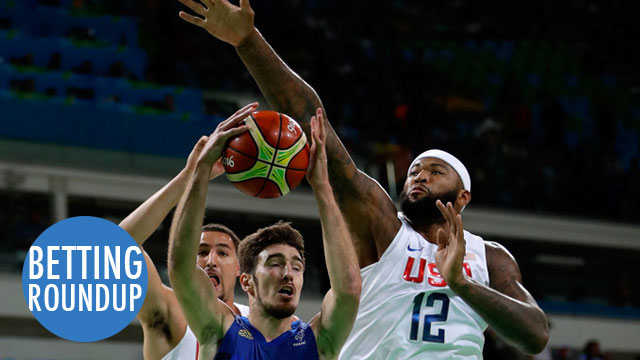Twice weekly, we’ll comb through as many articles, tweets and podcasts as we can find related to the world of sports betting and daily fantasy sports, and publish the good stuff here.
Stumble upon something you think we should include? Email [email protected].
* * *
The NBA is reportedly close to signing a 6-year $250,000 deal with Sportradar, which will provide data to bookmakers.
In the U.S. sports betting is illegal in 46 states. NBA commissioner Adam Silver has spoken out in favor of legalized and federally regulated betting on sports, which he says is inevitable. Leonsis said at the time of his investment that he was attracted to Sportradar because of its deep experience in sports betting.
Meanwhile, NBA data is valuable outside of the U.S., particularly in China, where some 300 million people play basketball. Domestically, Sportradar has focused on building its business with media and technology companies, including Facebook Inc., Google Inc. and Twitter Inc. In June it signed a deal to provide global sports data to the Associated Press. The company also supplies data to daily fantasy sports companies such as FanDuel, which along with DraftKings cleared a significant legal hurdle earlier this month when New York Governor Andrew Cuomo signed a bill that legalized and regulated the industry in his state.
Despite the USA men’s basketball teams early struggles in the Rio Olympics, they were still listed as a 1-to-20 favorite to win gold at the Westgate Las Vegas Superbook.
The quarterfinals begin Wednesday, with Team USA on course to play the fourth-place finisher in Group B — Spain as of Saturday morning — as long they beat France, which features NBA players Tony Parker, Nicolas Batum, Rudy Gobert and Boris Diaw.
The International Olympic Committee put out a release discussing their commitment to fighting against manipulation and corruption in the Games.
“We are supervising the whole betting market during the Olympic Games,” said the IOC President. “If a competitor should bet on any competition during the Games, we will know and we will take action so all the bets are supervised. Wherever there is something suspicious, our people are following up and there can be pretty severe sanctions.”
Participants at the Olympic Games are not permitted to bet on Olympic events and are obliged to report any approach or suspicion of manipulation. In order to detect issues, the betting market is monitored through the IOC’s Integrity Betting Intelligence System (IBIS), which is linked to key entities from the global sports betting market.
Maine is discussing whether or not to join the growing number of states that have passed daily fantasy sports laws.
“Should there be some regulation of these leagues to make sure that consumers are being protected when these leagues come into a state?” he said. “Secondly, is this a possible revenue source as well?”
One study estimated $2.6 billion in entry fees nationally were paid last year and that it will grow to more than $14 billion in 2020.
Katz has submitted a bill title for consideration in the next session so that Maine will take a look at all of the issues surrounding regulating the gambling. He does not have to submit a detailed proposal until after the session is underway.
State Rep. Matt Pouilot of Augusta, who also was at the meeting in Chicago, believes Mainers deserve some protection.
“There was some pretty big blow up with Draft Kings and, you know, a while back with some reports of insider baseball, no pun intended, going on with one of their employees,” he said.
Some states are passing laws to regulate the gambling sites, others are leveraging existing laws such as the Unfair Trade Practices Act.
An article published by Covers last month goes through the creation and history of Pay-Per-Head sportsbooks.
The agent (the industry term for “bookie”) didn’t want to be on the hook for big money if his players lost too much – having to share his winnings with Johnson’s operation – and purposed that his clients simply use Johnson’s online sportsbook interface and call center to place their bets, with the agent still collecting money and paying out. In turn, he would pay Johnson a specific amount each week per customer for the service: a Pay-Per-Head fee.
